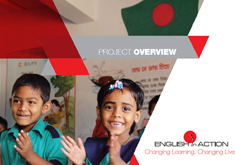By: Sonia Burton (EIA, The Open University) and Rhiannon Moore (TESS-India, The Open University)
English in Action made an impact at this year’s English Language Teachers Association of India (ELT@I) conference in Jaipur, India, with three papers and a workshop on EIA’s work in Bangladesh.
Representatives from EIA – Dr. Isabelle Perez-Gore, Lecturer in International Development, and Sonia Burton, EIA Research and Evaluation Specialist – attended and presented at the event held between 21-23 August 2014.
The conference theme, ‘From Classes to Masses’, was particularly relevant to the EIA programme which currently supports 8000 Government school teachers across Bangladesh to use communicative teaching methodologies in their English classes to engage their students in active learning. The event provided a platform for teachers, teacher educators, researchers, academics and practitioners from across India, South Asia and around the world to meet, exchange views and learn about English language teaching approaches, new trends/projects, and the use of technology for teaching English.
EIA representatives gave a hands-on workshop on EIA introducing participants to the approach and materials utilised for professional development and classroom activities through mobile phones. They also presented on research into the perceptions of EIA teachers and students to learning English and using English in the classroom.
Further to this, Isabelle presented on research with EIA into exclusion in the classroom, and the importance of making teachers aware of which learners they speak to and various ways to engage every student. Sonia, with Rhiannon Moore (OU Project Officer, TESS-India project), also presented on the evaluation and research of EIA and TESS-India, both large-scale school-based teacher development programmes.
Isabelle also joined members of a panel for a discussion on the question ‘Is English still a tool of conquest or quest?’ In her comments, Isabelle stated that learning should be a discovery for students and teachers, which is personalised and localised, and done in a positive, supportive and inclusive environment.
Overall, the conference comprised a wide range of discussion emphasising the varied learning needs of teachers and students and the importance of making interventions authentic and context-specific – key principles which underpin the EIA schools approach.
August, 2014






